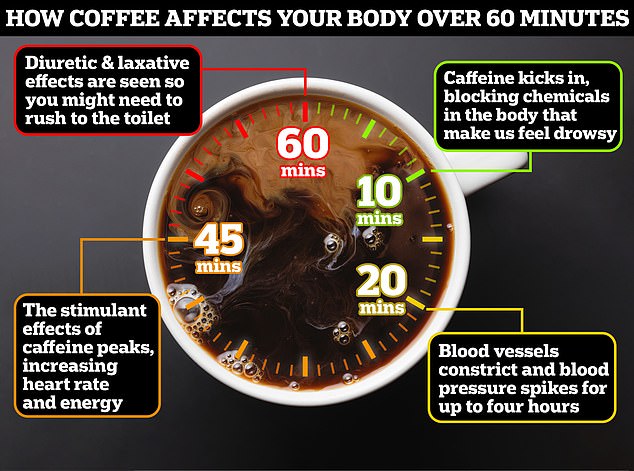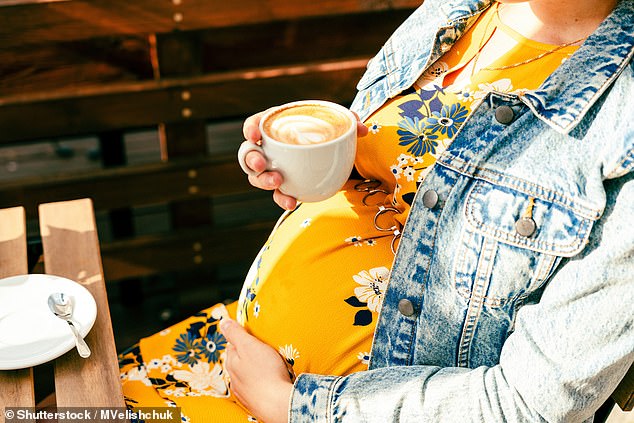It is a substance that pregnant women have been urged to avoid for years.
But coffee, a staple for office workers and bleary-eyed travelers around the world, may be safer for pregnant women than previously thought, a study of tens of thousands of women and their babies suggests. children.
The discovery flies in the face of previous research and years-old advice from the NHS, either urging women to limit their consumption of caffeine, a coffee stimulant, or avoid it altogether.
A leaflet distributed to pregnant women by the health service clearly warns that “one cup of coffee a day approximately doubles the risk of stillbirth” and adds that “there is no known safe level of caffeine.”
However, the study by Australian researchers suggests that some of these fears about caffeine are exaggerated and not supported by solid evidence.
Coffee, a staple for office workers and travelers around the world, may be safer for pregnant women than previously thought, a study of tens of thousands of women and their children suggests. stock image
However, they added that women should still follow authorities’ guidelines on daily caffeine intake limits.
Scientists at the University of Queensland examined data from tens of thousands of Norwegian families.
They chose this group due to Scandinavians’ general love for a cup of coffee and, compared to the UK, the lack of stigma between pregnant women and coffee drinking.
The experts analyzed both genetic data from families and questionnaires on coffee consumption during pregnancy.
They also interviewed parents about their children’s development in an attempt to explore any potential links to coffee consumption during pregnancy and an impact on their language and social motor skills up to the age of eight.
But Dr Gunn-Helen Moen, a Queensland molecular bioscience expert, said no such effects were seen.
“Our analysis found no link between coffee consumption during pregnancy and neurodevelopmental difficulties in children,” she said.
This goes against previous research linking that caffeine consumption by pregnant women could cause developmental delays in children.
Dr. Moen said previous research on the topic had not been able to determine whether caffeine was to blame for these problems compared to other potential factors that can affect the fetus during pregnancy, such as alcohol or tobacco use or a poor diet. .
However, he stated that the team’s study, published in the journal Psychological Medicineavoided this by using genetic testing of participants to find those most likely to be coffee drinkers.
“It mimics a randomized controlled trial without subjecting pregnant mothers and their babies to any harmful effects,” he said.
“The advantage of this method is that the effects of caffeine, alcohol, cigarettes and diet can be separated in the data, so we can only look at the impact of caffeine on pregnancy.”
Previous research by the team also suggested that drinking coffee during pregnancy does not affect birth weight, risk of miscarriage or stillbirth, contrary to NHS advice.
They hope their research can be followed by more work to explore which pregnancy factors really cause differences in children’s development.
The dangers posed by caffeine during pregnancy are related to the physiological changes that occur in the woman’s body as the fetus develops and that prevent the stimulant from being broken down as easily as before.

Have you ever wondered what exactly happens inside your body after you take that first sip?
This can cause it to accumulate in the body more than usual and pass through the placenta to the fetus, which cannot process it.
Therefore, the NHS advises pregnant women to limit themselves to 200mg of caffeine a day, the equivalent of two cups of instant coffee.
To stay within this limit, pregnant women should also be careful with other sources of caffeine, such as teas, sodas and energy drinks, as well as chocolate.
The UK guidelines, which are replicated in the US, on caffeine consumption during pregnancy are stricter than the international standard.
The World Health Organization’s recommendation is that women reduce their intake to less than 300 mg per day.
Research on the impact of coffee, or more specifically caffeine, during pregnancy has often found negative effects.
Earlier this year, Chinese research linked coffee consumption during pregnancy to an increased risk of autism in children, based on experiments with rats.
Previous research has also linked coffee consumption to a nearly one-inch increase in children’s potential height, and experts theorize that this is because the stimulant constricts the blood vessels that feed the developing fetus.


